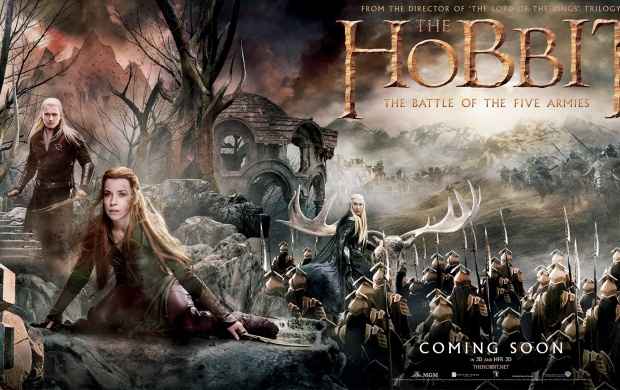With “Battle of the Five Armies” I found my self finally defeated by my disappointments and expectations and passively willing to experience this conclusion as a theme park ride rather than a story that I could possibly be engaged in, and actually, once set in that frame of mind, this movie breezed by rather inoffensively. Still, there's hardly any story speak of as it's only intention is to wrap everything up and because of the added content and tangential plot byways the movie gets lost in from time to time, a severer lack of point of view and purpose keeps this installment from transcending the tech-demo action-schlock that Jackson has apparently settled for.
After the dragon Smaug is quickly and anti-climatically destroyed by the peoples of Lake Town the humans are caught in an awkward position when they they ask to borrow some of the newly available treasure to rebuild their burning village and the Dwarves' fearless leader Thorin (Richard Armitage) refuses to share the wealth, now taking up his mantel as the new king of the mountain. The wood elves feel like they deserve a piece too since they did their part in helping the Dwarves reach Smaug's cave, and just as the three armies begin to duke it out for the booty the same Orcs who have been perusing the heroes since the beginning of the journey come back to finish what they started.
Along side the battle set-pieces that dominate the picture there exists a number of cameo plots, such as Gandalf (Ian McKellen) escaping near death after getting kidnapped by a not-so-mysterious evil force who's planning on making his big comeback, as well as a narratively inert love-triangle between the warrior elf Legolas (Orlando Bloom), the wood elf Taurial (Evangeline Lilly) and Kili (Aiden Turner), a young Dwarve who frankly doesn't have a shot. And in all of this, Bilbo (Martin Freeman), the titular Hobbit, is nearly sidelined and drown out of the film, serving almost no functional purpose.
There are faint ghosts of Tolkein's themes regarding greed and the petty but complicated nature of war and global economics that hums in the background of the spectacle but “Battle of the Five Armies” never settles on one place, one character, or one situation long enough to let anything substantive break through the bells and whistles. On a technical level everything moves along through the nonsense just sufficient to entertain but the the film's slap-dash plotting and heavy reliance on digital trickery kept me from truly believing in this world or caring about the people in it, and after the last three years of enduring this labored mess of an epic I desperately wish Peter Jackson would just go back to making-low budget horror films with puppets.
Grade: C-
Originally published in the Idaho State Journal/Dec-2014


